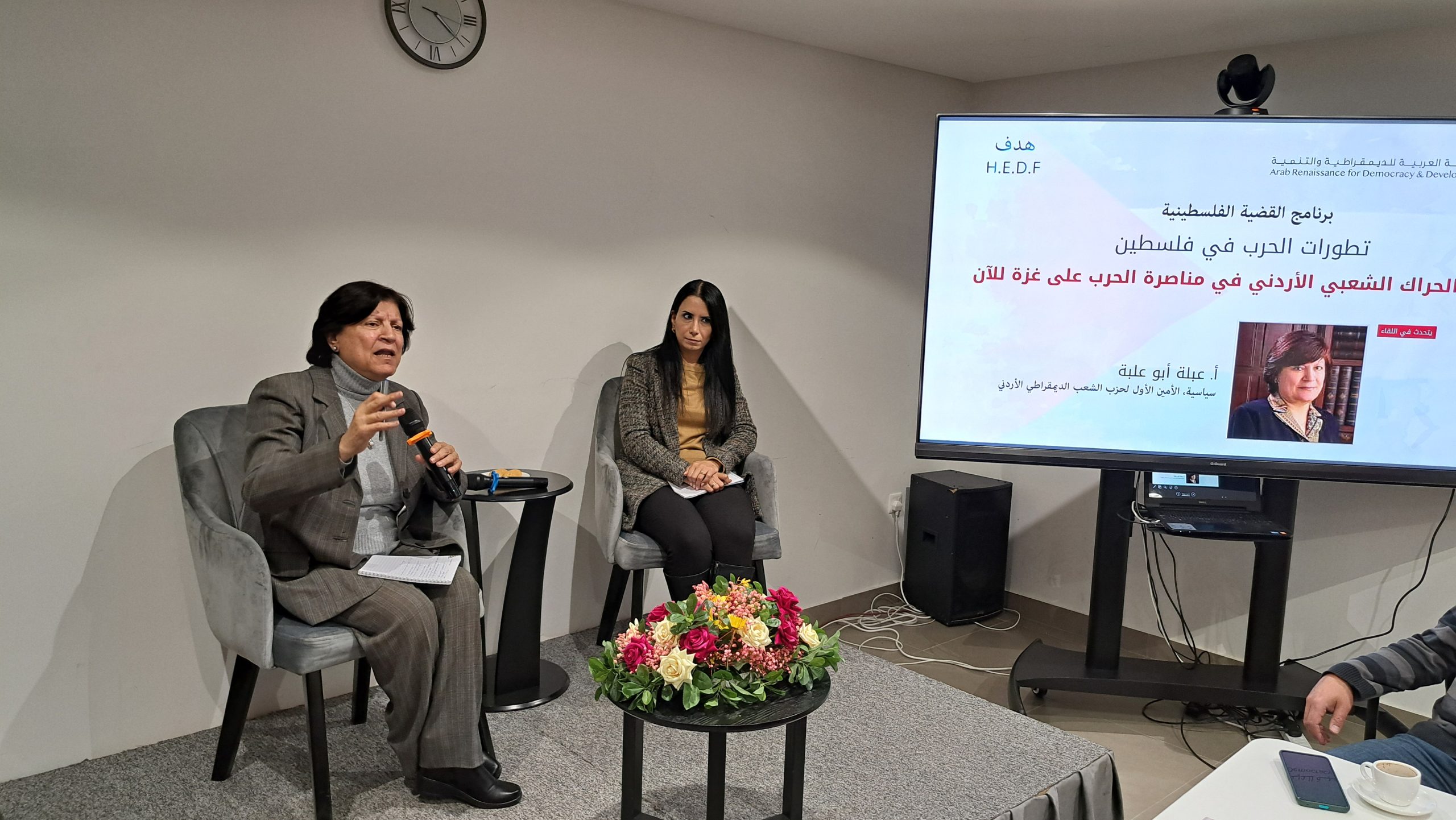“The Arab and Jordanian voices should not fade over the course of the war on Gaza. In fact, the public pressure must increase in rejection of the crimes of the Israeli occupation, through the continuation of mass demonstrations and solidarity rallies, but according to a real and organized political framework, as well as searching for more creative forms of expression.”
With these words, politician and first secretary-general of the Jordanian Democratic People’s Party, Abla Abu Elba, described the status of Jordanian and Arab grassroots movements in general, which stand in solidarity with Gaza and Palestine and demand an end to the war, as she saw that “the Jordanian grassroots movement has political awareness, and has been aware since the founding of the Kingdom of the dangers that the colonial Zionist movement carries, and its repercussions on the region.”
During the panel discussion held by the Arab Renaissance for Democracy and Development (ARDD), within the framework of the Palestinian Cause program, entitled: “Evaluating the Jordanian grassroots movement’s action against the war on Gaza so far”, on Thursday, January 11, 2024, as part of the second series of seminars to follow up on, record, and document the developments of the war in Palestine, in cooperation with the Human and Economic Development Forum (HEDF) at ARDD, Abu Elba noted that what happened during the war on Gaza imposed a new reality for the Jordanian grassroots movement, which manifested in the form of sit-ins in various governorates, regions, and streets of the Kingdom, without calls from any parties or organizations.
Furthermore, Abu Elba considered that the Jordanian grassroots movement is not limited to political elites, but also includes large public and social groups, stressing the importance of these movements being framed and organized as to be more mature and influential. “The Jordanian parties, Jordanian writers, and various institutions participating in the solidarity rallies have to pay serious attention to the content of the slogans being circulated, and to review them so they’d be different from before. Our tools of expression must change,” she said.
Partisan Abu Elba pointed out that the Western media supports and covers up Israeli crimes in Gaza, conveying false narratives that negate reality, which makes it imperative to continue the demonstrations that deliver several messages to the peoples of the world that the Palestinians are defending their rights, land, and resilience.
Abu Elba also pointed out that the Jordanian official position corresponds to that of the Jordanian street, as Jordan is one of the countries most involved with the Palestinian cause, for reasons related to geography and unity of the two peoples, in addition to the family and blood ties between them, which made it one of the first peoples to start non-stop weekly marches since the beginning of the war on Gaza, noting that the political system has been involved with the Palestinian Cause even before the start of the aggression on the Strip.
In conclusion, the participants praised the case brought by the South African government to the International Court of Justice, accusing the Israeli occupation state of committing the crime of “genocide” against the Palestinian people in Gaza, which has been well-received around the globe since its announcement and until the start of its first session last Thursday, stressing that Jordan was one of the first countries to support this step, given its importance and that it reflects the rights of the Palestinian people. The participants also called for supporting the cause in an organized political language, reviving the sense of belonging to the cause among the new generations, fortifying the home front, and boosting national unity. At the same time, they valued the efforts and action of civil society in advocating the Palestinian Cause through holding meetings around it, as well as publishing studies and research, which means that these institutions are aware of the importance of using diverse tools and forms of discourse when addressing the people, and their impact on change.


